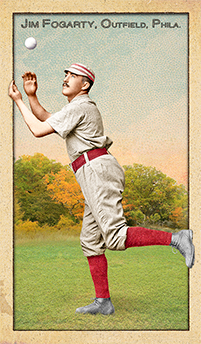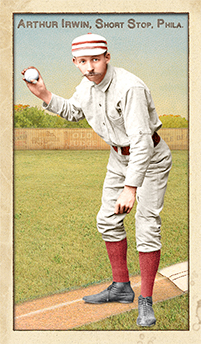
- Series: Beginnings: 1880's
- City: Philadelphia
- Team: Quakers
- League: National League
- Hall: Canadian Baseball Hall of Fame
Doc, Sandy, Cutrate, Foxy (1863-1927). Born in Canada, Arthur Irwin was: the 1st position player to wear a glove; a winning participant in the 1st interleague series to crown a "World Champion" club, the 1884 Providence Grays; a college coach; an MLB scout & an MLB business manager; a minor league owner; a major & minor league manager; the president of the 1st professional U.S. soccer league; an owner of cycling tracks; the inventor of a football scorecard; and an umpire of 50 National League games. Arthur Irwin is also a member of the Canadian Baseball Hall of Fame. After contracting stomach cancer, Irwin committed suicide by jumping over board a ship. It was soon discovered that Arthur Irwin had two unwitting wives, 1 in Boston, 1 in New York.
- In 1907, NY Highlanders' manager George Stallings rented a flat overlooking Hilltop Park and, equipping Irwin with binoculars and mirrors, had Irwin steal signs from NY's opponents and reflect them back to Stallings in the dugout.
- Irwin signed Lou Gehrig to his first professional contract, with the Hartford Senators in 1921. Although Gehrig used the alias "Lou Lewis" to hide his professional status from Columbia University, the ruse was discovered and Lou was forced to sit out a year of college ball.
- Irwin managed the Washington Nationals (1889), Boston Reds (1891), Philadelphia Phillies (1894-1895), NY Giants (1896) & the Washington Senators (1898-1899)
- While with the Providence Grays in 1883, Irwin broke two fingers on his left hand. Determined not to miss any games, Irwin got a buckskin glove, added padding and sewed two fingers together to allow his bandaged fingers to fit. After his injuries healed, Irwin kept with the glove. John Motgomery Ward soon followed. By the next season, 1884, most professional players were using the Irwin Glove.
- Elected to Canadian BB Hall of Fame: 1989
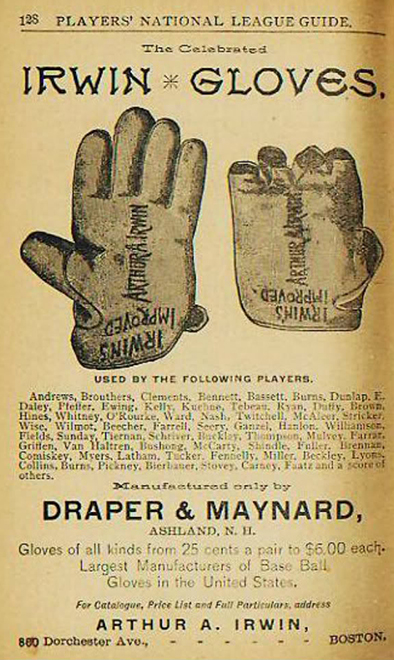
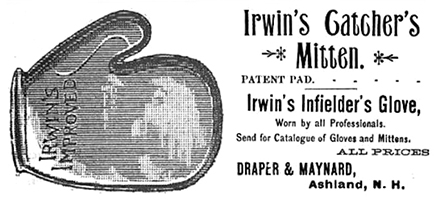
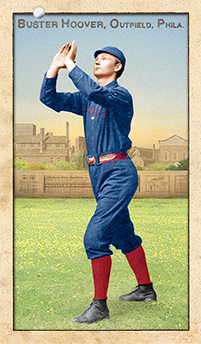
- Series: Beginnings: 1880's
- City: Philadelphia
- Team: Quakers
- League: National League
William James Hoover (1863-1924) was a prime example of players from the beginning of baseball who could shine at the amateur or minor league level and fail when up against the true elites of the game. In Buster’s case, the exception (the Union Association of 1884) proves the rule. That is where Hoover began in the “majors” but was really playing against minor-league caliber opponents. He wowed, hitting .364 (2nd in the league), third in OBP and slugging. Then that quixotic misadventure ended and the players had to find real homes. Buster’s was still in Philadelphia with Harry Wright’s Quakers where he hit .190. After years mostly in the minors (where he often excelled, averaging .306 over 11 seasons) he got a shot with the Orioles and hit .217. Finally, the Cincinnati Reds gave him a try in 1892: 14 games, .176. Hoover finished up hitting .305 for the Troy Washerwomen in 1894.
- Bill James has thoroughly analyzed the quality of the Union Association and found that it, like the anonymous Wisconsin dairy, could have embraced the motto: “Our Best Is None Too Good”
- Hoover’s uniform color on this card was changed in June, 2017 from black to blue/red to reflect recent reliable research by Craig Brown & friends at Threads of Our Game. Five cards were previously released featuring a black uniform.
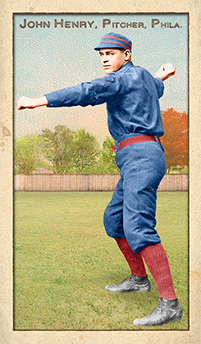
- Series: Beginnings: 1880's
- City: Philadelphia
- Team: Quakers
- League: National League
John Michael Henry (1863-1939) was a pitcher and outfielder with 4 major league teams for 4 seasons between 1884 & 1890. He compiled an overall .243 batting average in 218 at bats. He was 4-14 on the mound with a 4.09 ERA, one shut-out and 18 complete games. Henry began his time in the big leagues with the Cleveland Blues in the franchise’s final year. In ’85 Henry moved to the Orioles where he was part of a large supporting cast to the club’s ace, Hardie Henderson who recorded 60 decisions. The following year found Henry in D.C. with the cellar-dwelling Washington Nationals who played at the Swampoodle Grounds where their surroundings were as murky as their prospects. Henry’s swan song came with the NY Giants in ’90 where he played little as Amos Rusie and Jesse Burkett dominated the roster.
- Henry came to the major leagues in good company. He was sold by Hartford of the Eastern League to Washington with Connie Mack and three others for $3500
- A native of Springfield MA, Henry was interred at Mount St Benedict Cemetery, Bloomfield CT
- Henry’s uniform color on this card was changed in June, 2017 from black/red to blue/red to reflect recent reliable research by Craig Brown & friends at Threads of Our Game. Six cards were previously released featuring a black uniform.
- Series: Beginnings: 1880's
- City: Philadelphia
- Team: Quakers
- League: National League
William J. Gleason (1866-1933). A pitcher and 2nd baseman over 22 seasons with 7 different teams, Gleason went on to manage the Chicago White Sox from 1919 to 1923 and is perhaps best known for being the manager during the 1919 Black Sox Scandal. As a pitcher, Kid won 138 games. As a hitter, Kid compiled 1,946 hits & a .261 career BA.
- One of 29 players to play in 4 different decades
- Won 38 games in 1890
- Coached under Connie Mack for 8 seasons
- Gleason’s uniform color on this card was changed in April, 2017 from black to blue/red to reflect recent reliable research by Craig Brown & friends at Threads of Our Game. Nine cards had been previously released featuring a black uniform.
- Series: Beginnings: 1880's
- City: Philadelphia
- Team: Quakers
- League: National League
James G. Fogarty, (1864-1891) was a speedy outfielder and infielder with the Philadelphia Quakers of the NL and the Philadelphia Athletics of the Players’ League where he was also the manager. Fogarty was one of the swiftest of the early era, stealing a league high 99 bases in 1889. In his seven years in Philly, Fogarty was a consistent offensive contributor, driving in 35 to 58 runs each season.
- A native San Franciscan, Fogarty graduated from St Mary’s College of California
- Joined the short-lived Players’ League, 1890 in an attempt to break the reserve clause
- Died way too early of tuberculosis in Philadelphia at age 27






